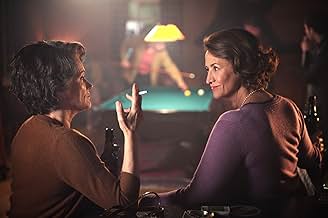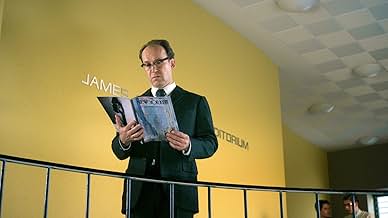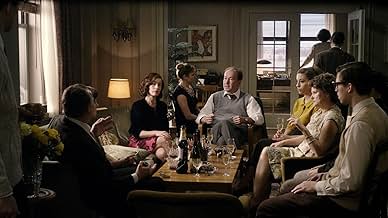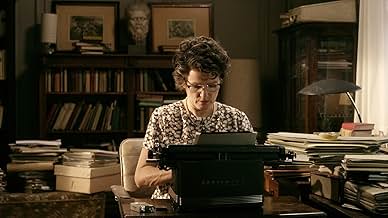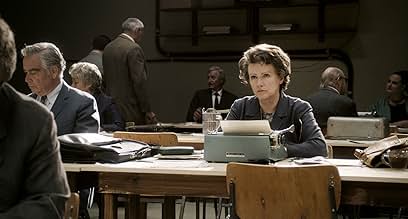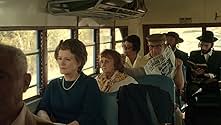अपनी भाषा में प्लॉट जोड़ेंA look at the life of philosopher and political theorist Hannah Arendt, who reported for 'The New Yorker' on the trial of the Nazi leader Adolf Eichmann in Jerusalem.A look at the life of philosopher and political theorist Hannah Arendt, who reported for 'The New Yorker' on the trial of the Nazi leader Adolf Eichmann in Jerusalem.A look at the life of philosopher and political theorist Hannah Arendt, who reported for 'The New Yorker' on the trial of the Nazi leader Adolf Eichmann in Jerusalem.
- निर्देशक
- लेखक
- स्टार
- पुरस्कार
- 8 जीत और कुल 18 नामांकन
- Student Laureen
- (as Leila Schaus)
फ़ीचर्ड समीक्षाएं
Arendt left Germany in 1933 for France, but when Germany invaded France, she found herself in a detention camp. When the film begins, she is a happily married woman with friends such as the writer Mary McCarthy, and she is a professor at, among other places, the New School in New York City.
Hanna is very excited about covering the trial, but her husband, Heinrich, is afraid it will take her back to those dark days.
While observing Eichmann, Arendt is struck by the fact that he was an ordinary man with nothing special about him. This causes her to think about the nature of evil itself.
She decides that he's not a monster but a person who suppressed his conscience in order to be obedient to the Nazis. She thus created the concept of the "banality of evil."
She believed also that some Jewish leaders at the time had fallen into this trap and unwittingly participated in the Holocaust. Her critics failed to understand her meaning.
In some camps, her New Yorker articles were not well received, as she was seen as a heartless turncoat who blamed the victims. Hanna has to defend her ideas, and the price she pays for them is high.
Barbara Sukowa does a magnificent job as Arendt, showing the woman's brilliance, courage, affection for friends and family, and hurt when some people she loved turned against her.
It's surprising that she was met with as much disdain as she was -- but Arendt did not believe in blind adoration of any group. She took people on an individual basis.
As far as the banality of evil, evil has always had the ordinary face of people sitting back and doing what they're told. Or, as Martin Luther King said, doing nothing.
I'm sure many of us have experienced this in the workplace -- I know I did. It's then that you realize the true nature of most people. Everyone can say they have ethics - but do they have ethnics when they stand to lose something?
Beautifully directed by Margarethe von Trotta, who also co-wrote the screenplay. A difficult subject made clear, a complicated woman understandable -- no small feat. A thought-provoking film.
All that said, and these are certainly ideas worth mulling over, this is a film for ideas and for philosophy buffs, not for film buffs. Why do I say this? Because this movie is slow, at least for American audiences. The beginning is confusing. We see a woman in New York but we don't know the date. She speaks German. We see a man get off of a bus heading to "Victoria" in the middle of nowhere. He is promptly kidnapped. We don't know when or where. Eventually, we learn the kidnapped man is Adolph Eichmann who is nabbed by the Mossad in Argentina in 1960. Much of the movie unfolds slowly. This is a film about thinking. It is not about doing much or feeling much. It is an intellectual film.
There's one semi-action scene in the film where a 1950s vehicle corners Arendt on the road where she is walking. Israeli secret agents pour out of the car and threaten Arendt, trying to prevent her from publishing her book about Eichmann. Based on someone knowledgeable, Professor Roger Berkowitz, academic director of the Hannah Arendt Center for Politics and the Humanities at Bard College in New York, it appears this scene was invented out of whole cloth to try to give the film at least some suspense. But that's not what this film is about.
It's about thinking and it's about the fearsome, word-and-thought-denying banality of evil and how Hannah Arendt was the first to identify this 20th-century pathology of the human psyche.
Thanks to the Camera Cinema Club in San Jose for showing this film.
Few movies based on historical figures manage to combine a good sense of character with a first-rate story. Hannah Arendt is an exception. It is directed by Margarethe von Trotta, who had focused on such diverse (and strong) women of history as the nun and mystic Hildegard von Bingen and the leftist revolutionary Rosa Luxemburg. Her latest film is the story of one key episode in the life of Hannah Arendt, the German-American philosopher and political theorist. But Hannah Arendt transcends the bounds of "feminist" filmmaking. It is a work that puts before the viewer key questions about the nature of evil, about acceptance of authority, and about personal responsibility. At the same time it is a fine piece of storytelling.
Arendt was a German Jew who had studied under the noted philosopher Martin Heidegger, and who had a romantic relationship with him that soured when the Nazis came to power and Heidegger publicly supported them. She soon left Germany for France but in 1940 was imprisoned by the Vichy regime in the detention camp in Gurs. Escaping after a few weeks imprisonment, she fled with her husband to the U.S. Throughout and after the war she was active in Jewish causes, including the Zionist movement. In the 1950s she began a career of writing and teaching, which included appointments at such universities as Princeton, Yale and the University of Chicago. She became noted for two popular books, The Origins of Totalitarianism and The Human Condition.
The film deals with one short period in her life, Arendt's reporting on the 1961 Adolf Eichmann trial in Jerusalem for the New Yorker magazine, coverage she later turned into a book. In here account she spoke of "the banality of evil," evil done without thinking, because people were "following orders." Arendt's suggestion was that Eichmann was evil not so much because he was a monster, but because he was a mindless bureaucrat. Although she did not disagree with the guilty verdict or Eichmann's hanging, she was critical of the conduct of the trial. Even more controversial was her submission that some Jewish leaders contributed to the magnitude of the Holocaust by their complicity with the authorities. While she recognized the futility of open rebellion, she suggested that less cooperation would at least have saved more lives. Such suggestions, especially coming from a prominent Jew, provoked a firestorm of criticism, and threatened both Arendt's career and lifelong friendships. The movie becomes not just about a single life, but about freedom of expression - the sometimes harsh clash between ideas and fixed opinions - and the great personal costs this can involve.
Still, a movie that focuses so much on one individual requires a superb piece of acting. Director von Trotta gets this from Barbara Sukowa, who played both Hildegard and Rosa Luxemburg in her earlier films. Sukowa brings to the screen not only a supremely intelligent woman, but a very principled and determined one. At the same time she portrays a woman who can be tender and compassionate, and understanding even of her detractors. To blend such widely divergent qualities is no easy task, but Sukowa succeeds in anchoring them securely in the character she plays. Axel Milberg as Heinrich Blücher, Arendt's husband, more reserved, but supportive and protective, is equally credible. Another solid performance comes from Janet McTeer as the political activist, author, and Hannah's steadfast friend, Mary McCarthy. Included also among her inner circle was her secretary, Lotte, played very sympathetically and competently by Julia Jentsch. Two longtime Jewish friends, one in New York, Hans Jonas, and another in Jerusalem (also her former teacher), Kurt Blumenfeld, are very well represented by Ulrich Noethen and Michael Degen. And a very unrepentant and unapologetic Martin Heidegger is played by Klaus Pohl.
In addition to good acting a film that deals with the realm of ideas also requires a finely tuned screenplay and talented direction so that it does not just show pictures of "talking heads." Director von Trotta cooperated with Pam Katz on the script, and what they produced is obviously a labor of love. The situation of ideas against the background of such horrific concrete acts as genocide, and in particular against the showpiece trial of Eichmann, brings them into contact with the very real world. That reality is heightened by the decision not to dramatize Eichmann himself, but to show the genuine article as he appears in the TV footage of the trial. There is such genuine horror there, and yet such obvious banality, as to give Arendt's musings real weight.
In the end the film obliges the viewer to confront the questions Arendt is trying to raise. Are the roots of evil obvious or can they be far more subtle? Where does responsibility begin, and who in a society must take responsibility for the acts of the whole body? The film does not preach, but it certainly raises vital questions. A real gem! Hannah Arendt premiered at the Toronto International Film Festival on September 11, 2012. The movie will go into general release on January 17, 2013.
If that's what director Margarethe von Trotta had in mind when making this film, she succeeded. Her film documents an important chapter in the story of Arendt's life: her articles about the Eichmann trial in Jerusalem, and the ensuing tsunami of negative reactions. The reason for those negative reactions was the way Arendt regarded Eichmann: not as a monster, but as a man 'incapable of thinking', a dimwit who just followed orders. This fitted her theory of 'the banality of evil': the worst kinds of evil are often the result of not thinking for oneself.
Veteran actress Barbara Sukowa portrays Arendt as a difficult and complex woman, who is a brilliant philosopher but also stubborn, arrogant and single-minded. In one scene, we see her lying on a couch, when the phone rings. On the other end of the line is her editor, who faces a deadline and asks if she is making progress with the articles. 'Of course I'm working hard, and it would be nice if I could continue working instead of chatting on the phone', she answers. After that, she returns to the couch, lies down and continues smoking her cigarette.
Sometimes it seems that Arendt is incapable of feeling, just as Eichmann is incapable of thinking. Even when her best friends turn away from her, she continues insulting them by telling them 'she doesn't love the Jewish people'. She means it in a philosophical way - you can't love a people the way you love individuals. But nevertheless, it comes across as cold-hearted and insensitive.
Arendt is clearly an interesting person. But that doesn't make 'Hannah Arendt' an interesting film. From a cinematographic point of view, the movie doesn't have much to offer. It's a rather straightforward account of this episode in Arendt's life. The only thing that adds a little depth to the film are the flashbacks of the romantic affair she had with her teacher, the famous philosopher Martin Heidegger, who sympathized with the Nazis. The film suggests that this affair influenced the way she regarded Nazis such as Eichmann, but doesn't make this explicit. In my view, the film is interesting as a history lesson about this remarkable woman, but not as a great cinematographic experience.
Barbara Sukowa portrays the German Jewish philosopher during the period she covered the Adolf Eichmann trial in Israel for The New Yorker. The film confronts the controversy Arendt raised when (i) she redefined Eichmann not as a monster but as an ordinary nobody, exemplifying "the banality of evil," (ii) she reported that some Jews collaborated with the Nazis, resulting in more deaths than chaos would have caused, and (iii) she said she loves her friends but not any "people," in this case, the Jews. On all three counts she was condemned for abandoning her people. Today, at a remove from the heat of that moment, she was clearly correct on all counts. For more see www.yacowar.blogspot.com.
Not loving the Jews was not being anti-Semitic but refusing to emotionalize her consideration of the issues. Arendt was opposed to the blanket love of any group of people, not based on personal engagement, because such nationalist or other group identification precluded the thoughtful consideration of any issues around them. She most valued a rational, thoughtful approach that was not prejudged or proscribed by any -ism or convention. As for some Jews' collaboration, she simply reported facts that arose at the trial. (Indeed, Rudolf van den Berg's new film Suskind details precisely that collaboration.) Nor was that observation anti-Semitic, for the possibly well-intentioned collaboration in the face of horrid danger is a plausible response among any people. Arendt was pilloried for facing the facts and for rejecting myths. That's what historians are required to do and apparently what philosophers periodically have to remind them to do.
क्या आपको पता है
- ट्रिवियाFor a deeper understanding of this story, one might care to watch Operation Finale (2018), which depicts the undercover mission to find and extract Adolf Eichmann from Argentina and bring him to trial in Israel. Showing the background of an operation sanctioned by PM David Ben-Gurion, the film gives a glimpse of the complexity of Eichman's character, his futile attempts to justify his actions and tell his side of the story.
- गूफ़When Arendt stands on the terrace of her hotel in Jerusalem at looks across the Valley of Hinnom at the Old City, there are Israel flags flying from the Tower of David complex. However, the Old City of Jerusalem was still under Jordanian control in 1961.
- भाव
Hannah Arendt: You describe a book I never wrote.
Siegfried Moses: A book that will never be allowed in Israel. And won't appear anywhere else either if you have any decency left.
Hannah Arendt: You ban books, and lecture me about decency!
- कनेक्शनFeatured in Kino Kino: Hannah Arendt (2013)
टॉप पसंद
- How long is Hannah Arendt?Alexa द्वारा संचालित
विवरण
- रिलीज़ की तारीख़
- कंट्री ऑफ़ ओरिजिन
- आधिकारिक साइट
- भाषाएं
- इस रूप में भी जाना जाता है
- 漢娜鄂蘭:真理無懼
- फ़िल्माने की जगहें
- उत्पादन कंपनियां
- IMDbPro पर और कंपनी क्रेडिट देखें
बॉक्स ऑफ़िस
- US और कनाडा में सकल
- $7,17,205
- US और कनाडा में पहले सप्ताह में कुल कमाई
- $31,270
- 2 जून 2013
- दुनिया भर में सकल
- $88,80,936
- चलने की अवधि
- 1 घं 53 मि(113 min)
- रंग
- ध्वनि मिश्रण
- पक्ष अनुपात
- 2.35 : 1





